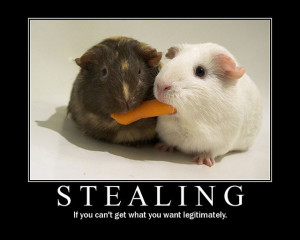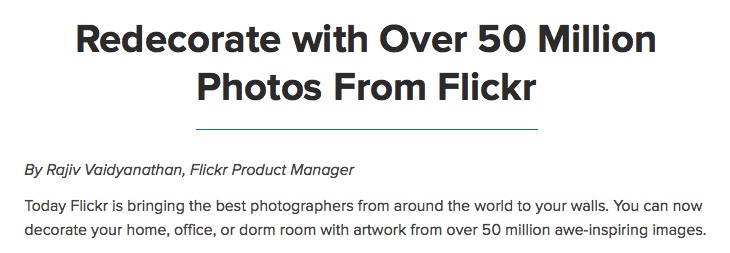
CC image “Stealing” courtesy of ryancr on Flickr. Some rights reserved. NOT a commercial license!
Recently, it’s come to my attention that Flickr is doing something new with its users’ photos. Or rather, Yahoo!, which owns Flickr, is doing something new. They are doing it WELL below the radar. As someone with a Flickr account, I never even received an email notification*, something even Facebook is good at doing, with its recent news about the updates to its privacy policy.
What is Yahoo!/Flickr doing? Yahoo! is exploiting other artists’ work for their personal gain. I can put this another way. Yahoo! is stealing.
Not that I found this out from Yahoo! mind you. Thanks to the glories of social media, I found out about it from a friend who also uses (used?) Flickr, far more intensively than I do.
You won’t see Yahoo! saying anything remotely like “stealing,” of course. Yahoo!’s official position on this (once I went to the trouble of hunting it down; as I said, I didn’t receive any notification from Yahoo! A search under “Yahoo selling Flickr photos” which is as close to what’s happening as a search query can get, didn’t even turn up a press release on the first page of results. In fact, even when I went hunting specifically for a press release or official announcement, I didn’t get any information. I finally found a link to Yahoo!’s Tumblr through another article on The Daily Dot. That’s great outreach, Yahoo! *snort*), is as follows:
Yes, you are reading that correctly. Yahoo! is posing this whole situation as a boon to the consumer of photo art. Indeed, I think it IS a boon to the consumer. Only recently I came across this awesome artistic rendition of a Language Family Tree by Minna Sundberg, and really wished there was a poster available for it. The image is beautiful — appealing both to my inner language nerd and my wannabe-artist. Judging by the comments, I’m not the only ready-made consumer, either. However, I feel that Yahoo!’s move is no boon to any but the most select photographers. I think this move violates trust at a basic level, and thoroughly mauls artistic integrity and choice.
(See the bottom of this post for links to additional information on this issue)
Basically, Yahoo! is offering the printing of images from two sources: selected photographers, with whom I presume they had a conversation about this arrangement before the announcement went live to consumers; and a number of Creative Commons commercial-use-licensed images, which I doubt had any prior notice. They are offering two payment schemes, one to each group. The pre-selected photographers get to keep 51% of their profits.
The Creative Commons-licensing photographers get zero.
While I think 49% is a steep commission, let’s face it, those photographers had the opportunity to discuss the deal and accept the terms. I’m much more concerned with everyone who licensed their photos through Creative Commons, who are now being treated like shabby work-for-hire widget-makers, only without the hiring part.
Yahoo! is under its legal rights to do what it is doing. However, legal does not make right. Morals and the law might intersect sometimes, but this is far from a given. I am incensed with Yahoo!’s hubris on behalf of artistic and creative folk everywhere. Someone else has done the work, had the vision, and then expressed their joy in sharing what they’ve been able to create. Yahoo!, who had absolutely nothing to do with this creative process, decides to cash in. On work that isn’t theirs.
That is crap, Yahoo! That is real crap.
I can think of a number of more thoughtful ways of pursuing the idea of making beautiful photos accessible to people who want the art. What all of these ways have in common is that a) they take more time, b) they take more work, and c) they involve dialogue with the artists who’ve created this opportunity in the first place.
I can imagine that reaching out to all the creators and setting up a dialogue has the potential to create any number of administrative headaches. But the payoff is almost without price. People are posting their photos on Flickr with Creative Commons licenses — or they were; that’s certainly changing — because they WANT to share their work. If they are sharing their art for free, they are certainly there for recognition, and given the opportunity might jump at even more recognition! On the flipside though, remember they are offering their work for free. How can you presume to take that as a tacit agreement for you to charge for it? And keep all the change?
The gall is breathtaking.
Yahoo! has acted unilaterally and way overstepped its boundaries. You could argue that Yahoo! is serving the consumer, but in the process, the artist gets screwed. Almost no one has a problem with this, except the artists themselves, but in reality we all suffer. How long do you think someone whose work is so disrespected will continue to create work, or if they create it, to share it with anyone else?
When we drive creators off the stage, we all lose.
== == ==
*If you are a Flickr user with Creative Commons-licensed images, and you received an official notification from Yahoo! about this, I’d love to hear from you. I haven’t licensed my photos, which right now I am profoundly relieved about. Perhaps notices only went out to those who were affected; I want to be accurate and level-headed and not make any unjust accusations.
Note: I use a lot of Flickr Creative Commons-licensed images in this blog. I always use photos that are not commercially licensed, and I provide links back to the Flickr page and credit to every photographer. I appreciate everyone whose images I’ve been able to use, and their gracious permission to do so. Strictly speaking, my ability to find images this way should not be impacted because the license is different than what’s under discussion here, but you never know. Folks may pull out of the license altogether. I feel like I am making a conflict of interest disclosure, which might be overdone… but I want to be transparent.
Note 2: Links. You may already be informed of the issue discussed in this post. If you aren’t, feel free to type in a few search terms. Here are two more links that I turned up, in case you are interested in diving deeper:
Wall Street Journal
Slate

